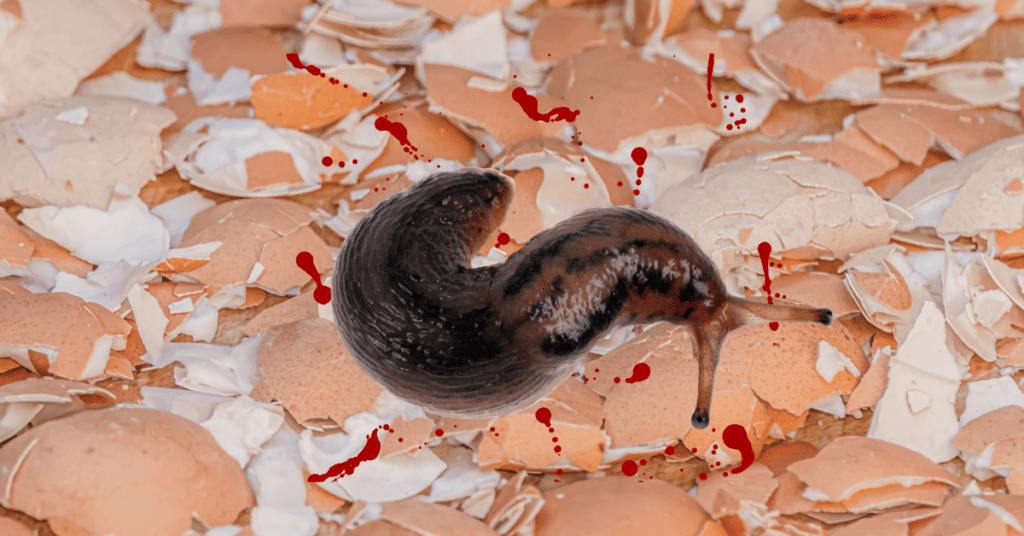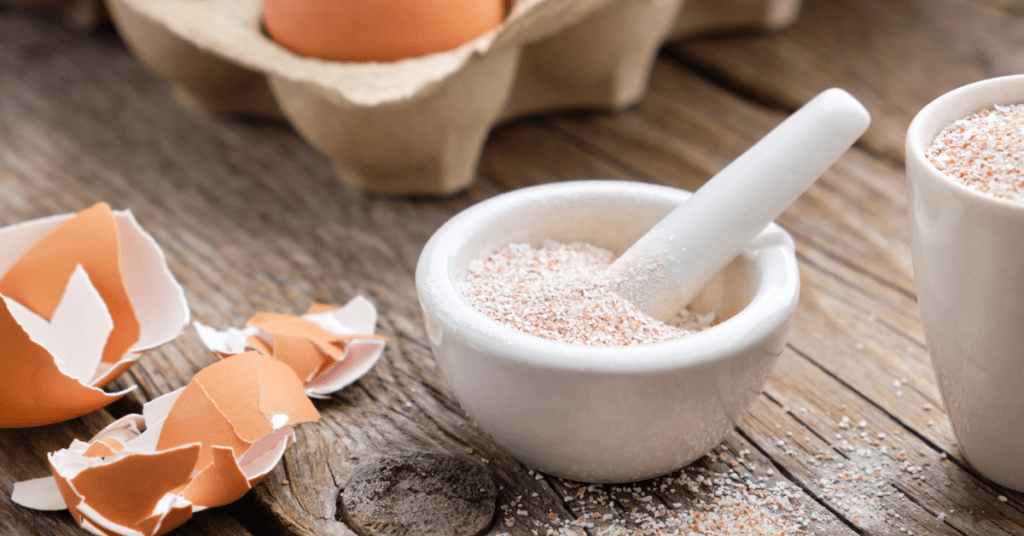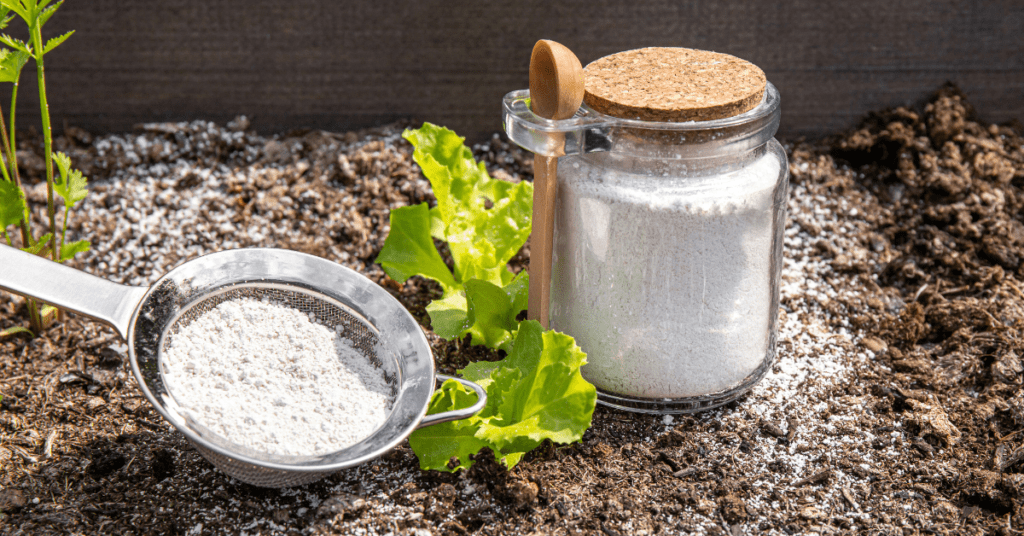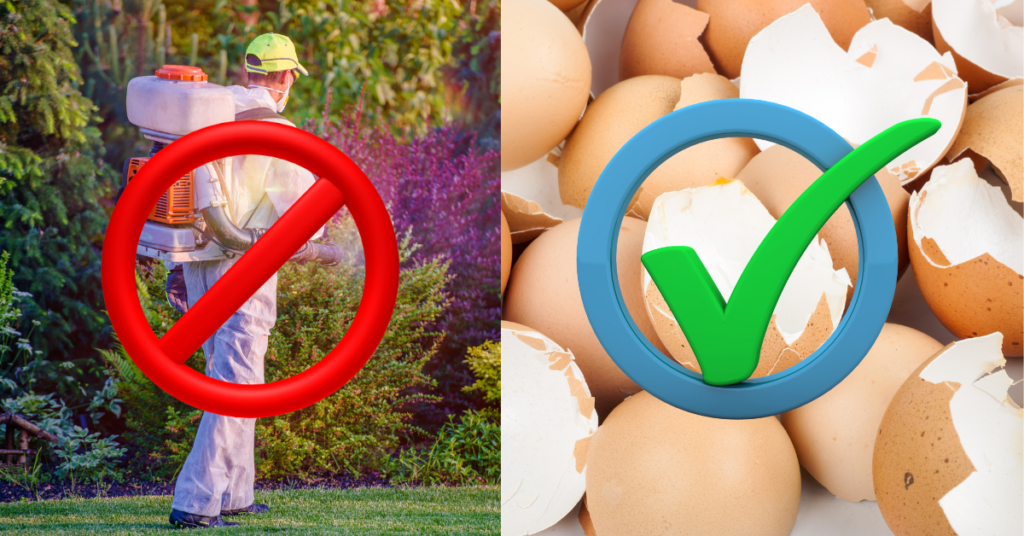One of my favorite methods of organic pest control is using eggshells. Yes, you read that correctly – eggshells.
Eggshells, often considered waste, can be incredibly useful in the garden. Not only do they add valuable nutrients to the soil, but they can also be used as a natural pest control method.
Eggshells contain calcium carbonate, which pests such as slugs and snails find repulsive. However, when crushed into small pieces, eggshells create a barrier that pests won’t cross, making them a perfect organic pest control solution.
How Eggshells Deter Pests

Eggshells work as a pest control method due to the crushed shells’ sharp edges and abrasive texture.
When pests such as slugs and snails attempt to cross the barrier of eggshells, the sharp edges cut into their bodies, causing them to turn back.
The abrasive texture of the crushed shells also acts as a deterrent for crawling pests like ants and beetles.
The Benefits of Using Eggshells Over Chemical Pesticides
Firstly, eggshells are natural and safe for the environment, unlike chemical pesticides that can harm beneficial insects and pollute water sources.
Secondly, eggshells are a sustainable option as they are a waste product that can be easily collected and reused.
Finally, eggshells are cost-effective and readily available, making them an affordable option for gardeners on a budget.
How to Prepare Eggshells for Use in Your Garden

Before using eggshells as a pest control method, they must be adequately prepared.
Start by collecting the eggshells from your kitchen, making sure to rinse them thoroughly to remove any egg residue. Once the eggshells are clean, allow them to dry completely.
Next, crush the eggshells into small pieces using a mortar, pestle, rolling pin, or food processor. Be sure to crush the eggshells into small pieces, as larger pieces are not as effective as a pest deterrent.
Different Methods of Using Eggshells for Pest Control
One way is to create a barrier of crushed eggshells around the base of plants susceptible to pest damage. This barrier will prevent crawling pests such as slugs and snails from reaching the plants.
Another way to use eggshells is to sprinkle the crushed shells directly on top of the soil around plants. This method is especially effective for deterring pests such as caterpillars and beetles.
Combining Eggshells with Other Natural Pest Control Methods

While eggshells are an effective pest control method, they can also be combined with other natural pest control methods.
Eggshells and Diatomaceous Earth
Diatomaceous earth is a natural substance that can control pests like ants, cockroaches, and bed bugs.
When combined with eggshells, it becomes even more effective. Grind the eggshells into a fine powder and mix it with diatomaceous earth.
Sprinkle the mixture around areas where you’ve seen pests, and the sharp edges of the eggshells will cut the pests’ exoskeletons, causing them to dehydrate and die.
Eggshells and Garlic
Garlic is a natural insect repellent that can keep pests like mosquitoes and aphids away.
When combined with eggshells, it becomes even more effective. Crush some garlic cloves and mix them with water, then soak some eggshells in the mixture.
Strain out the eggshells and transfer the garlic water to a spray bottle. Spray the mixture around your garden or home to repel pests.
Eggshells and Neem Oil
Neem oil is a natural insecticide that can control pests like spider mites, aphids, and whiteflies.
When combined with eggshells, it becomes even more effective. Grind the eggshells into a fine powder and mix it with neem oil.
Apply the mixture to your plants using a spray bottle, focusing on areas where pests are present.
Eggshells and Companion Planting
Companion planting is the practice of planting certain plants together to help repel pests and improve overall plant health.
Eggshells can be added to the soil around companion plants to provide nutrients and repel pests like slugs and snails.
For example, planting eggshells around lettuce can help keep slugs and snails away while providing calcium to the soil.
Eggshells for Specific Pests – Slugs, Snails, and Caterpillars
Eggshells are particularly effective at deterring slugs, snails, and caterpillars. To use eggshells to prevent these pests, create a barrier of crushed eggshells around the base of plants that are susceptible to damage.
This barrier should be at least an inch wide and several inches tall for slugs and snails. For caterpillars, sprinkle the crushed shells directly on top of the soil around the plants.
Eggshell Tea and Its Benefits for Your Garden
Another way to use eggshells in the garden is to make eggshell tea.
Eggshell tea is a nutrient-rich liquid that can be used as a plant fertilizer.
To make eggshell tea, place a handful of crushed eggshells in a jar of water. Allow the mixture to sit for a few days, stirring occasionally.
Once the water has become cloudy and the eggshells have dissolved, strain the mixture and use the liquid to water your plants.
Eggshell tea provides plants with a boost of calcium, which is essential for healthy growth.
Other Uses for Eggshells in the Garden
In addition to using eggshells as a pest control method and fertilizer, there are several other ways to use them in the garden.
Crushed eggshells can be used to create a natural mulch, which helps to retain moisture in the soil and suppress weeds.
Eggshells can also be used to amend the soil, as they are a great source of calcium and other essential nutrients.
Conclusion – Why Eggshells are a Sustainable and Effective Option for Pest Control
Eggshells are a sustainable and effective option for pest control in the garden. They are a natural and safe alternative to chemical pesticides, cost-effective, and readily available.
Using eggshells as a pest control method, you can deter pests such as slugs, snails, and caterpillars while adding valuable nutrients to your soil.
So, say goodbye to harmful chemicals and try using eggshells in your garden today!

